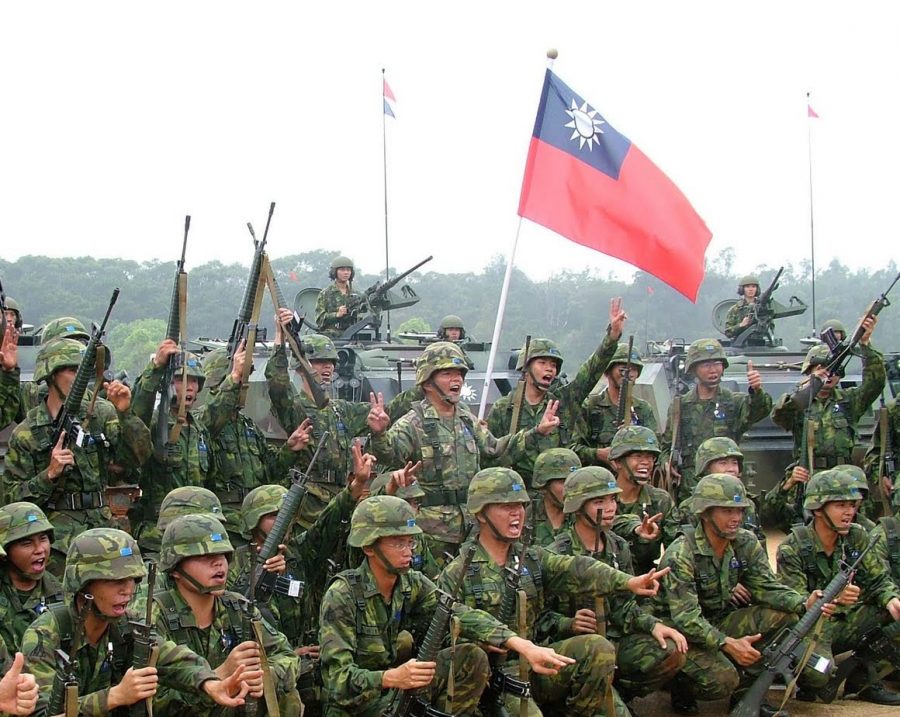With Taiwan, the world stands against Chinese bullying
China’s attempts at bullying the democratic and free nation of Taiwan appear to be only a bluff, at least, for the time being.
Taiwan, formerly governing the mainland prior to Communist rebellion following the conclusion of the second world war, has long been considered part of the mainland by the Communist government in Beijing. However, due to Taiwan’s strategic position in the South China Sea in terms of trade and military power projection, the island nation also manufactures about 60% of the world’s most advanced semiconductors such as CPUs and other chips that power the devices which drive the lives of billions globally. The Chinese Communist Party has expressed great interest and much to gain in taking control of the country. Despite all of this, on October 5th, U.S. President Joe Biden and Chinese President Xi Jinping agreed to fulfill the conditions of the Taiwan Relations Act, designed to reduce the escalating tensions between Taipei and Beijing, signed into law by former U.S. President Jimmy Carter in 1979. The agreement stipulates one simple condition – the U.S. will maintain diplomatic relations with mainland China if, and only if, Taipei and Beijing establish ties via strictly peaceful means. Additionally, any invasion of Taiwan by mainland China would immediately dissolve diplomatic ties with the U.S. However, the question now is; will modern China care about the dissolution of all ties with the United States? When Mr. Biden spoke with Mr. Xi, he “made it clear…that [China] should not be doing anything other than abiding by the agreement.” So far, the U.S. has walked a thin line of agreeing that Taiwan is a nation with no sovereignty of its own nor that Taipei is the true government of China, recognizing Beijing as the government of China, while simultaneously pledging to assist in the buildup of Taiwan’s island defenses. When Biden was asked for clarification, he stated that the U.S. intends to abide by the Act.
For forty-two years the U.S. has relied on the Taiwan Relations Act, even as former President Bill Clinton tried to use the coveted “most favored nation [in trading]” status as a method of diplomacy to steer mainland Communist China toward bettering its abysmal record on human rights over the past half century at the time. However, neither President Carter could foresee China’s world-domination as an economic superpower, nor could President Clinton foresee China using its economic status to build its military might to heights which meet or exceed those of the U.S. What has occurred over the span of the past six months makes our diplomatic efforts appear to be the mere playground appeasement of the schoolyard bully.
This past July, when the Communist Chinese People’s Liberation Army launched a surprise attack across the Indian border and murdered 20 Indian soldiers, Chinese quasi-military ships sank a Philippine fishing boat. During the same period of time, Beijing ordered the severe beatings of peaceful pro-democracy demonstrators in Hong Kong and then ordered trade sanctions against Australia after Australian Prime Minister Scott Morrison stated that COVID-19 originated in China. President Xi felt it was time to show the world China’s rising influence–and show he did.
Down but not defeated by the pandemic, the rest of the free world appears, finally, to no longer be willing to tolerate China’s bullying. Countries like India ordered Amazon to list the nation-point of manufacture on online retailers, so they and other free people could begin boycotting products designed and/or made in China.
India has not stopped there, banning Chinese social media platform Tik Tok and some 58 Chinese apps from phones. The Philippines also appears to be willing to challenge China’s bullying into areas of the South China Sea four years after Philippine President Rodrigo Duterte, a fervent anti-U.S. politician, promised billions investment in China and to terminate the Visiting Forces Agreement with the U.S. China’s aggressive South China Sea expansionist tactics so angered the people of the Philippines, President Duterte was forced to keep the agreement to keep U.S. naval vessels in Subic Bay, rather than Chinese military vessels.
Prior to the increasingly tense military situation in the South China Sea, the most captivating rallying point behind which free nations railed against Beijing’s bullying was in the free city of Hong Kong as its people were brutally oppressed by Beijing. The United Kingdom, former rulers of the city, offered British citizenship to half of the over 7 million people of Hong Kong while simultaneously rejecting Chinese company Huawei and its plans to expand 5G cellular networking in the U.K.
Likewise, Australia has begun training 500 cyber specialists in order to counter Chinese state sponsored cyber criminals who have infiltrated and disrupted its industries, infrastructure, and its government. As a more serious defiance against China’s aggression, ninety-four percent of Australians no longer want their economy to be aligned with China’s in any form. Japan and others in the region are beginning to see the threat as well, and others now see the threat that China poses to democracies and the free world itself. In the span of only six months, the world now stands unified against the Chinese threat.
Although former U.S. presidents could not envision the emergence of China as a world threat, much of the world does now. Despite the Taiwan Relations Act with President Carter and regardless of the most-favored nation trade status awarded to the country by President Clinton, the U.S. Congress, finally in a unanimous vote, sanctioned China for its oppressive tactics in Hong Kong. No longer does the U.S. stand isolated against the Communist oppressors.













